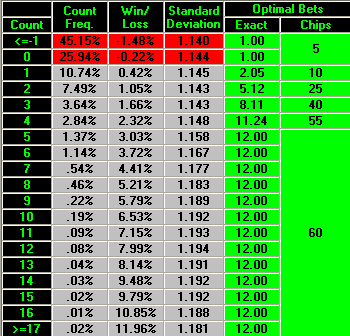When discussing some of the side bets in blackjack, you’ll notice that I use terms like “expected return” and “house edge.” Here’s an explanation of those concepts.
The expected return is the amount of money that you can expect to win or lose (in the long run) from each wager. For example, if you’re placing an even-money $1 bet, and your chances are 40% fora win and 60% for a loss. This would give you the following: $0.40 – $0.60 = -$0.20. The negative sign in front of the total means that for every dollar wagered you can expect to lose $0.20 (onaverage, over a long period of time—in the short run, anything can happen).
How Much Should I Bet In Blackjack BY How Much Should I Bet In Blackjack in Articles If you find product, Deals.If at the time will discount more Savings So you already decide you want have How Much Should I Bet In Blackjack for your, but you don't know where to get the best price for this How Much Should I Bet In Blackjack. If you kept betting that way for 10,000 hours of blackjack that means you placed $100 million worth of individual bets, added together. The house edge is half of one percent so if we take $100 million and multiply it by.005 we get $500,000 which is how much the casino expects to make off of you in the long run if you continue to bet $100 a hand. Dec 11, 2005 How to Win at Blackjack. When gambling, luck shines on only a few people. Blackjack, however, is one of the only casino games where you as a player have a fair shot against the house. This is because blackjack depends on strategizing based.
Here’s an example where you have multiple options for winning. Let’s say that you’re betting $1 on a slot machine, and you have a 20% chance of winning $4, a 25% chance of winning $3, and a 55%chance of losing. Here’s how the expected return would be calculated:

20% x $4 = $0.80
25% x $3 = $0.75
55% x -$1 = -$0.55
$0.80 + $0.75 – $0.55 = $1
In this example, you could expect to win $1 per spin over the long term. Of course, no sane casino ever offers a slot machine game with a positive return.
Blackjack How Much To Bet
The house edge, meanwhile, is the ratio of the average loss to the initial bet. Expressed as a percentage, this number demonstrates the subtle way in which casino games bleed aplayer dry.
Blackjack Card Counting How Much To Bet
For example, a 5% house edge means you can expect to lose $5 for every $100 wagered—or $0.05 for every $1. This might not sound like a lot, but it gives the casino a financial advantage over theplayer and allows for a steady accumulation of profit.
How To Play Blackjack
Game designers and casinos carefully calculate the expected return and house edge before putting a game on the casino floor. The end result is that the house almost always has an advantage overthe player, which explains why the major casinos rake in obscene amounts of money on an annual basis.